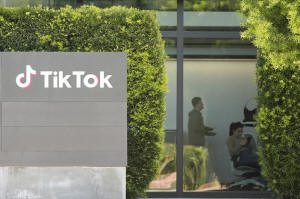The rise - and potential fall - of TikTok in the US
 Send a link to a friend
Send a link to a friend
 [January 18, 2025]
By HALELUYA HADERO [January 18, 2025]
By HALELUYA HADERO
The possibility of the U.S. outlawing TikTok kept influencers and users
in anxious limbo during the four-plus years that lawmakers and judges
debated the fate of the video-sharing app. Now, the moment its fans
dreaded is here, but uncertainty over TikTok’s future lingers.
On Friday, the Supreme Court upheld a federal law that bans the
immensely popular, trend-setting social media platform starting Sunday
unless its China-based parent company, ByteDance Ltd., sells to an
approved buyer.
The unanimous decision ended a legal battle that pitted national
security concerns against free speech rights. TikTok, ByteDance and some
of the devoted users who rely on the platform for entertainment, income
and community argued the statute violated the First Amendment. The Biden
administration sought to show ByteDance’s ownership and control of
TikTok posed an unacceptable threat.
The Supreme Court ruling, however, is not guaranteed to end the TikTok
saga, which has become enveloped in the wider battle between Beijing and
Washington. A Biden administration official told The Associated Press on
Thursday that the outgoing administration would leave the law's
implementation — and potential enforcement — to President-elect Donald
Trump.
Trump, who is set to return to the White House the day after the ban
takes effect, has credited TikTok with helping him win the support of
more young voters in last year’s election. A Trump adviser said this
week that the incoming administration would “put measures in place to
keep TikTok from going dark.” What those measures will look like — and
if they can withstand legal scrutiny — remained unknown Saturday.

Here’s a look at how TikTok became a global cultural phenomenon and the
political wrangling that followed the app's commercial success:
The rise of TikTok
TikTok is one of more than 100 apps developed in the past decade by
ByteDance, a technology firm founded in 2012 by Chinese entrepreneur
Zhang Yiming and headquartered in Beijing’s northwestern Haidian
district.
In 2016, ByteDance launched a short-form video platform called Douyin in
China and followed up with an international version called TikTok. It
then bought Musical.ly, a lip-syncing platform popular with teens in the
U.S. and Europe, and combined it with TikTok while keeping the app
separate from Douyin.
Soon after, the app boomed in popularity in the U.S. and many other
countries, becoming the first Chinese platform to make serious inroads
in the West. Unlike other social media platforms that focused on
cultivating connections among users, TikTok tailored content to people’s
interests.
The often silly videos and music clips content creators posted gave
TikTok an image as a sunny corner of the internet where users could find
fun and a sense of authenticity. Finding an audience on the platform
helped launch the careers of music artists like Lil Nas X.
TikTok gained more traction during the shutdowns of the COVID-19
pandemic, when short dances that went viral became a mainstay of the
app. To better compete, Instagram and YouTube eventually came out with
their own tools for making short-form videos, respectively known as
Reels and Shorts. By that point, TikTok was a bona fide hit.
TikTok encounters critics
Challenges came in tandem with TikTok’s success. U.S. officials
expressed concerns about the company’s roots and ownership, pointing to
laws in China that require Chinese companies to hand over data requested
by the government. Another concern became the proprietary algorithm that
populates what users see on the app.
During his first term in office, Trump issued executive orders in 2020
banning TikTok and the Chinese messaging app WeChat, moves that courts
subsequently blocked. India banned TikTok — along with other Chinese
apps — the same year following a military clash along the India-China
border that killed 20 Indian and four Chinese soldiers.

[to top of second column]
|

People work inside the TikTok Inc. building in Culver City, Calif.,
on March 11, 2024. (AP Photo/Damian Dovarganes, File)
 In 2021, the Biden administration
dropped the Trump-era orders but left in place a national security
review of TikTok by a little-known government agency known as
Committee on Foreign Investment in the United States, or CFIUS.
Negotiations falter
Between January 2021 and August 2022, representatives for TikTok
engaged in serious negotiations with the Biden administration about
the app’s future in the U.S. The talks resulted in a 90-page draft
security agreement that the company presented to CFIUS in August
2022. The two sides then ceased substantive negotiations, according
to TikTok’s attorneys, though some meetings also took place in
following months.
A copy of the draft agreement submitted in court showed that it
would have opened up TikTok’s U.S. platform for security inspections
and blocked access of U.S. user data from China. The company says it
has already implemented some provisions of the agreement, including
routing U.S. user data to servers operated by software giant Oracle.
In its lawsuit to overturn the sell-or-ban law, the company said it
spent more than $2 billion to implement aspects of its appeasement
plan, which it calls Project Texas.
But the Department of Justice and administration officials argued in
court documents that the proposal failed to create sufficient
separation between TikTok's U.S. operations and China. They also
said the opacity of TikTok’s algorithm, coupled with the size and
technical complexity of the platform, made it impossible for the
U.S. government – or its technology provider, Oracle – to
effectively guarantee compliance with the proposal.
In February 2023, the White House directed federal agencies to
remove TikTok from government-issued devices, mirroring some other
countries that also prohibited the use of the app on official
devices.
The following month, lawmakers grilled TikTok CEO Shou Chew during
an hours-long hearing in which he sought to reassure a tense House
committee that the platform prioritized user safety and should not
be banned due to its Chinese connections.
According to court documents, TikTok’s representatives had their
last meeting with CFIUS in September 2023. Later that year,
criticism against the platform increased in volume among Republicans
in Washington who claimed the platform amplified pro-Palestinian and
anti-Israel content, an accusation the company vigorously denied.

Ban-or-sale law
Efforts to ban TikTok resurfaced in Congress early last year, and
quickly gained bipartisan support among lawmakers who voiced about
the potential for the platform to surveil and manipulate Americans.
The legislation the Supreme Court upheld passed the House and the
Senate in April after it was included as part of a high-priority $95
billion package that provided foreign aid to Ukraine and Israel.
President Joe Biden quickly signed it, and the two companies and a
group of content creators quickly sued.
A lower court upheld the statute in early December. The legislation
gave ByteDance nine months from the enactment date to sell TikTok,
and a possible three-month extension if a sale was in progress.
The deadline's arrival the day before Trump’s inauguration makes
things tricky. Only the sitting president can issue a 90-day stay on
the ban and can do so only if a buyer has taken concrete steps
toward a purchase.
Although experts have said the app would not disappear from existing
users’ phones Sunday, new users won’t be able to download it and
updates won’t be available. That will eventually render the app
unworkable, the Justice Department has said in court filings.
All contents © copyright 2025 Associated Press. All rights reserved |